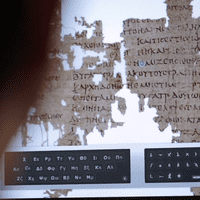
Jun 6, 2013
For over a hundred years, boxes of corn flake-sized scraps of ancient paper have been carefully tucked away at Oxford.
The fragments are thousands of years old, dug out a of 30-foot deep trash mound in what was once the city of Oxyrhynchus, Egypt.
When the first pieces were dusted off in 1897, they were so startling they helped inspire a whole new field of study: papyrology. Since then, they've revealed a heap of historic discoveries, discoveries that led to a footnote to Revelations, a challenge to Homer and a glimpse of ancient porn. (If you haven't heard our episode Detective Stories, that's all I'm going say about Jad's three favorite Greatest Hits of Ancient Garbage...go listen.)
Only a tiny fraction of what's been unearthed has been studied so far. Scholars have been painstakingly sorting and translating bits of text for over a century, but mining these teeny pieces of papyri is a slow, slow process.
That's where you and the Internet come in.
The Oxyrhynchus papyri are a classical gold mine -- an accidental archive of writings that historians feared had been lost to the ages:
The traditional classical world leaves us no actual books: the great Library of Alexandria, the twenty-eight public libraries of imperial Rome have disappeared without trace. We are left with copies of copies, chance survivals through the Empire and Middle Ages. We have ideas of what’s missing, but these losses seemed final. -- P.J. Parsons, "Waste Paper City"
But because of Oryrhynchus, words that no one had read in a thousand years were suddenly reintroduced to the world.
Piecing together lost gems from a pile of shredded scraps is a staggering amount of work -- more than any one person could get through in a lifetime.
To speed the process along, researchers have asked volunteers to pitch in with crowdsourced transcribing -- you don't need to know anything about the classics or read Greek (the language of most of the texts). All you need is an eye for detail, some spare time, and maybe some swelling music to remind you how insane it is that some of these snippets could reshape history.
Want to give it a try? Take a few minutes to spin through the interactive tutorial, then dive in and start matching up characters. The work you do will automatically get saved, and passed on to scholars who'll carefully check everything and start trying to identify and translate the texts.
Even with tons of volunteers, it's still going to take a long time. But come on, how often do you get a shot at maybe—possibly, someday—helping to unlock a 2,000-year-old secret?